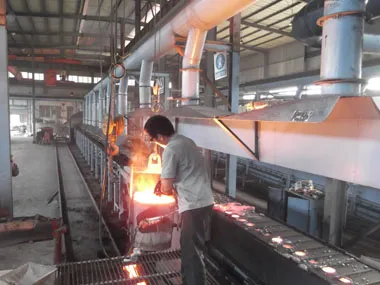Mobile:+86-311-808-126-83
Email:info@ydcastings.com
small water pump impeller
Understanding Small Water Pump Impellers Function and Design
In the world of water management, small water pumps play a crucial role, enabling the efficient movement of water for various applications, from residential use to industrial processes. At the heart of these pumps lies the impeller, a component that is often overlooked yet integral to the pump's functioning. This article aims to explore the intricacies of small water pump impellers, their design, functionality, and significance in ensuring optimal pump performance.
What is an Impeller?
An impeller is a rotating component of a pump that transfers energy from the motor to the fluid, generating flow. In small water pumps, the impeller is typically designed as a centrifugal impeller, which uses rotational energy to propel water outward from the center. This design involves a set of curved blades that guide the water as it moves through the impeller, converting the mechanical energy from the motor into kinetic energy in the fluid.
How Impellers Work
The operation of an impeller in a small water pump can be understood through several key concepts. When the motor turns the impeller, it creates a low-pressure area at the center of the impeller. This drop in pressure allows water to be drawn into the pump. As the impeller rotates, the blades push the water outward, increasing its velocity and pressure. This pressure allows the water to be discharged at a higher rate and force than it entered, facilitating the movement of water from one location to another.
The efficiency of an impeller is crucial for the overall performance of the pump. Factors such as the shape, size, and angle of the impeller blades contribute significantly to its hydraulic performance. A well-designed impeller minimizes energy loss and ensures that water is moved effectively with minimal turbulence.
Types of Impellers
There are various types of impellers used in small water pumps, each tailored for specific applications. The most common types include
1. Open Impellers These impellers have no shroud or cover and are typically used in applications that handle liquids with solids, such as sewage pumps. Their design makes them easier to clean and maintain.
small water pump impeller

2. Closed Impellers Characterized by having a cover on both sides, closed impellers are more efficient and provide higher pressure. They are suitable for clean water applications and are commonly found in residential water pumps.
3. Semi-Closed Impellers These impellers combine features of both open and closed designs. They provide a balance of efficiency and ease of maintenance, making them versatile for various applications.
Impeller Material and Design Considerations
The material used for making impellers also plays a significant role in their performance and longevity. Common materials include plastics, bronze, and stainless steel, each offering different levels of resistance to corrosion, wear, and impact.
Moreover, the design of the impeller must take into account the specific requirements of the application. For instance, pumps intended for high flow rates require larger impellers with a wider diameter, while those designed for higher pressures may feature smaller, more intricate designs.
Importance of Impeller Design in Pump Efficiency
A well-designed impeller not only enhances the pump's efficiency but also indirectly influences energy consumption. Poorly designed impellers can lead to cavitation, a phenomenon where vapor bubbles form and collapse within the fluid, causing damage to the pump and reducing its effectiveness. Therefore, engineers must focus on optimizing impeller design to minimize energy loss, reduce noise levels, and ensure smooth operation over the pump's lifespan.
Conclusion
In summary, small water pump impellers are crucial components that drive the efficiency and effectiveness of pump operations. Understanding their function, design, and importance is essential for anyone involved in water management, whether in residential, commercial, or industrial settings. As technology continues to evolve, innovations in impeller design will likely pave the way for even more efficient and versatile small water pumps, contributing to sustainable water management practices across the globe.
-
Why Is Choosing the Right Motor Housing Critical for Engine Performance?NewsJul.18,2025
-
Which Impeller Types Best Optimize Your Pump’s Efficiency?NewsJul.18,2025
-
Optimize Maintenance Efficiency with Durable Oil Catch SolutionsNewsJul.18,2025
-
Maximize Pump Performance with Precision-Engineered ComponentsNewsJul.18,2025
-
Elevate Industrial Flow Systems with Precision-Engineered ComponentsNewsJul.18,2025
-
Boost Durability and Functionality with Precision Power CastingsNewsJul.18,2025











